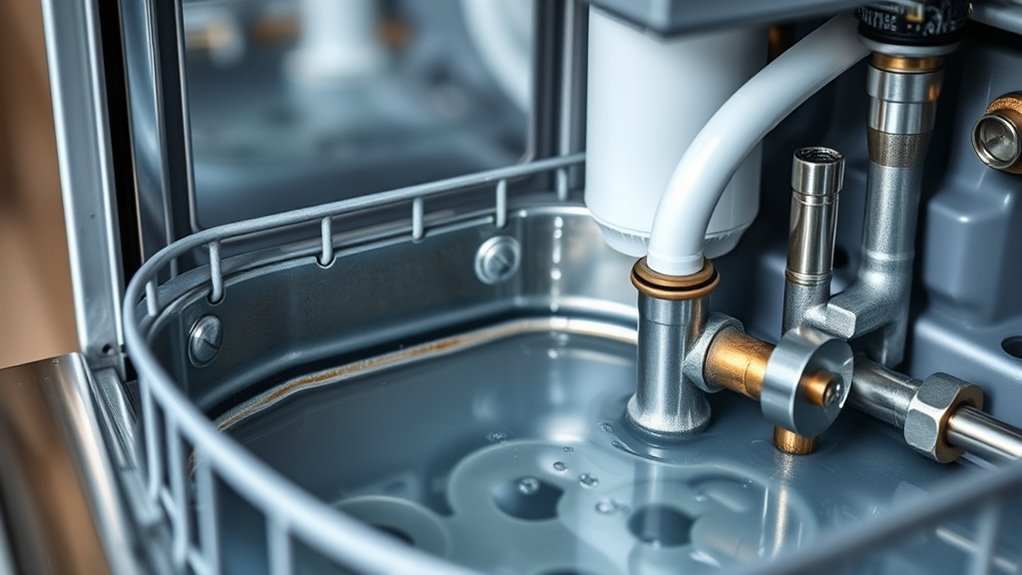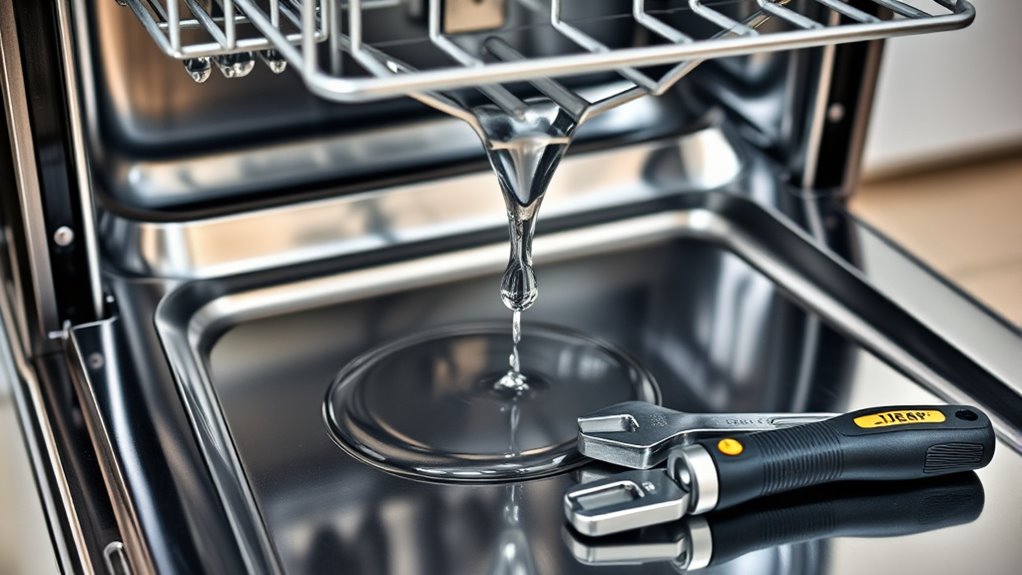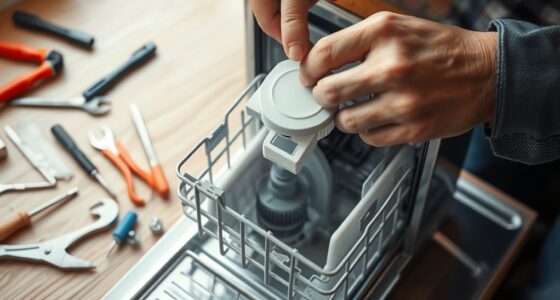To troubleshoot a leaking countertop dishwasher, start by inspecting the door seal for dirt, cracks, or tears and clean it thoroughly. Check the water drain system for kinks, clogs, or debris in hoses and filters. Make certain the float switch moves freely and isn’t stuck, as overfilling can cause leaks. Examine the detergent dispenser for cracks or blockages. If you spot any damage or need detailed steps, keep exploring to find the right solution.
Key Takeaways
- Inspect and clean the door seal for cracks, tears, or dirt buildup to ensure proper sealing.
- Check all hoses and the drain system for clogs, kinks, or leaks that may cause water backup.
- Verify the float switch moves freely and isn’t stuck or dirty, preventing overfilling.
- Remove and clean the detergent dispenser to prevent spills and ensure it seals correctly.
- Examine the internal tub for cracks, rust, or damage that could cause leaks during operation.

A leaking dishwasher can disrupt your daily routine and cause water damage if not addressed quickly. The first step in troubleshooting is to understand that many leaks stem from improper dishwasher maintenance or water drain issues. By taking a systematic approach, you can identify the root cause and prevent further damage.
Start by inspecting the door seal. Over time, the rubber gasket around the door can wear out or become dirty, allowing water to escape during cycles. Clean the seal thoroughly with a damp cloth and check for cracks or tears. If the gasket is damaged, replacing it will often solve the leak. This is a simple fix that can prevent ongoing issues, especially if the leak occurs during the wash cycle.
Next, examine the dishwasher’s water drain system. Clogged or kinked hoses can cause water to back up and leak out. Remove the lower panel or access panel to locate the drain hose, and ensure it’s free of debris, kinks, or cracks. Sometimes, food particles or soap scum can clog the drain filter or the pump, leading to water drain issues. Regular dishwasher maintenance involves cleaning these filters and checking hoses for blockages. Clearing out any obstructions will help ensure water flows properly and doesn’t leak during drainage.
Another common cause involves the float switch, which detects water levels inside the dishwasher. If the float is stuck or dirty, it might signal the dishwasher to overfill, causing leaks. Lift the float to see if it moves freely and clean away any debris that might be blocking its movement. Make sure the float assembly isn’t damaged or stuck in the raised position, as this could cause overfilling and leaks. Additionally, understanding essential oils for water-related issues can help in maintaining the overall health of your dishwasher’s components.
Inspect the detergent dispenser for leaks. If the dispenser isn’t sealing properly or if detergent spills into the tub, it can cause water to leak out. Remove and clean the dispenser, and check its door for cracks or damage. Sometimes, using too much detergent or incompatible types can cause suds overflow, which might leak from the door or bottom of the dishwasher.
Finally, check for cracks or damage to the dishwasher’s tub or internal components. Visible cracks or rust could compromise the machine’s water containment, leading to leaks. If you find significant damage, replacing the affected parts or the entire dishwasher might be necessary.
Frequently Asked Questions
Can a Leaking Dishwasher Cause Water Damage to My Cabinets?
A leaking dishwasher can definitely cause cabinet water damage if not addressed quickly. Water pooling or dripping from the appliance can seep into your cabinets, leading to warping or mold growth. This also raises concerns about dishwasher safety, as leaks could cause electrical issues or further damage. You should inspect the leak promptly, fix any issues, and verify your dishwasher is properly sealed to prevent future damage and maintain safety.
How Often Should I Inspect My Dishwasher for Leaks?
You should inspect your dishwasher for leaks at least once a month to guarantee ideal leak prevention. Regular inspection frequency helps catch small issues before they become major problems, saving you time and money. Look for water pooling, unusual sounds, or damp spots around the unit. Staying proactive keeps your appliance running smoothly and protects your cabinets from water damage, giving you peace of mind.
Are There Any DIY Fixes for Persistent Leaks?
If you’re wondering about DIY fixes for persistent leaks, start by inspecting hoses and seals for cracks or loose connections. Tighten any fittings and replace damaged gaskets to help with leak prevention. You can also check the door latch and ensure the door closes properly. Regularly cleaning filters and checking for blockages can prevent future leaks. These simple DIY fixes can keep your dishwasher running smoothly and minimize leaks over time.
When Should I Call a Professional Plumber?
Sure, you could become a DIY leak detective, but when your countertop dishwasher keeps dripping like a leaky faucet, it’s time to call in a pro. A plumber consultation guarantees accurate leak diagnosis, saving you from a flood of frustration. If your attempts to fix it stall or worsen the drip, don’t delay—professional help is your best bet. Trust a plumber to stop the leak before it becomes a bigger disaster.
Is a Leaking Dishwasher Safe to Use Temporarily?
You might wonder if a leaking dishwasher is safe to use temporarily. Generally, it’s not recommended because water leaks can cause electrical hazards or damage your floor. For a temporary repair, you can place a towel or container under the leak, but only if you’re confident it won’t worsen. Ultimately, dishwasher safety is paramount; if the leak persists or worsens, call a professional to fix it properly.
Conclusion
Remember, addressing leaks early can save you from costly repairs down the line. Regularly inspecting door seals, hoses, and filters helps prevent leaks before they start. Did you know that over 90% of dishwasher leaks are caused by faulty door seals or loose connections? By staying vigilant and performing simple maintenance, you can keep your dishwasher running smoothly and avoid water damage. Stay proactive, and your appliance will serve you reliably for years to come.









